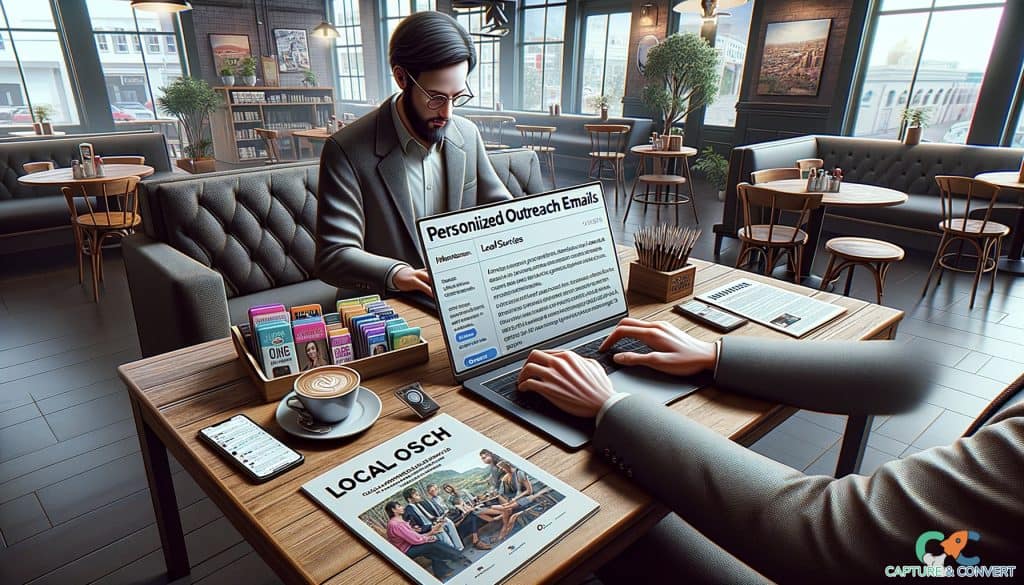Boost your local leads with 10 networking strategies tailored for businesses. From local events to personal branding, here's how to make connections that count.
For local businesses, networking holds immense potential for lead generation.
It's a powerful means to connect with potential clients, partners, and industry peers within your immediate geographic area.
Unlike broader marketing tactics, networking thrives on the authenticity of personal connections and the sense of community, making it a valuable asset for local business growth.
It's through these connections that local businesses can tap into local resources, referrals, and collaborations that translate into tangible leads and opportunities as proved by a research published by Mário Franco on April 16th 2018 in the Journal of Business Strategy.
In this article, we'll outline 10 networking strategies to enhance lead generation for local businesses.
Contents
- Networking Differences Between Local Businesses and Large Corporations
- Importance of Networking
- 1. Attend Local Events
- 2. Get Involved in Your Community
- 3. Form Business Partnerships
- 4. Join Local Professional Groups
- 5. Strengthen Referral Partnerships
- 6. Embrace Networking Groups
- 7. Tap into Alumni Networks
- 8. Use Cold Outreach Strategically
- 9. Prioritize Networking Follow-up
- 10. Boost Your Personal Brand
- Using Digital Platforms for Local Business Networking
- Finding Local Networking Opportunities
- Recommended Frequency of Networking
- Tools for Enhancing Networking
- Collaborative Networking with Competitors
- Strategies When Networking Doesn’t Yield Results
Networking Differences Between Local Businesses and Large Corporations

Local businesses benefit from a more personal and community-focused approach.
Unlike larger corporations, local businesses have the advantage of operating within a specific geographic area, allowing them to establish genuine, face-to-face connections with fellow local businesses, customers, and community members.
This localized approach fosters a sense of trust and familiarity, which is often challenging for larger corporations to replicate on a broader scale.
While larger corporations may rely on more impersonal strategies due to their extensive reach, local networking thrives on building strong, personal relationships within a close-knit community.
Importance of Networking
Networking is of paramount importance for local businesses as it serves as a vital channel for lead generation.
Building strong local connections and relationships within your community can open doors to a wealth of opportunities.
Local networking allows businesses to tap into the local market's nuances and preferences, helping tailor their products or services for maximum appeal.
Furthermore, it fosters trust and credibility, essential elements for driving leads and conversions.
Benefits

Listed below are 8 benefits of local networking for businesses.
- Community Engagement: It allows businesses to become actively involved in their local community.
- Building Trust: Establishes trust and credibility with local customers.
- Referral Opportunities: Creates a platform for referrals and recommendations.
- Market Insights: Provides valuable insights into local market trends and preferences.
- Partnerships: Facilitates collaborations with complementary local businesses.
- Word-of-Mouth Marketing: Boosts word-of-mouth marketing, a powerful lead generation tool.
- Customer Loyalty: Helps in building loyal, long-term customer relationships.
- Visibility: Increases local brand visibility and recognition.
Drawbacks
Listed below are 10 drawbacks of local networking for businesses.
- Time Commitment: Networking can be time-consuming.
- Budget Constraints: Costs associated with events and memberships.
- Overwhelm: Feeling overwhelmed by networking opportunities.
- Rejection: Fear of rejection or reluctance to approach others.
- Knowing Where to Start: Uncertainty about where to begin.
- Prioritize: Allocate dedicated time for networking.
- Budget Wisely: Set a networking budget.
- Set Goals: Define clear networking goals.
- Practice: Develop networking skills over time.
- Start Small: Begin with local events or groups.
Local networking significantly helps with lead generation for local businesses, outweighing the drawbacks.
Listed below there are 10 networking tactics for local business lead generation.
- Attend Local Events
- Get Involved in Your Community
- Form Business Partnerships
- Join Local Professional Groups
- Strengthen Referral Partnerships
- Embrace Networking Groups
- Tap into Alumni Networks
- Use Cold Outreach Strategically
- Prioritize Networking Follow-up
- Boost Your Personal Brand
1. Attend Local Events

Attending local events is a crucial networking tactic for local businesses.
By participating in such events, you get the opportunity to meet potential leads in person and build authentic relationships within your community.
This form of offline networking fosters trust and credibility, making it easier to convert these connections into actual leads.
The following list provides 5 insight on how to make the most of attending local events.
- Research Events: Identify local events relevant to your industry or niche.
- Prepare Elevator Pitch: Craft a concise and engaging elevator pitch.
- Bring Business Cards: Ensure you have plenty of business cards to exchange.
- Engage Actively: Actively participate in discussions and engage with attendees.
- Follow Up: After the event, follow up with new contacts to nurture relationships.
2. Get Involved in Your Community

Getting involved in your community is not just a goodwill gesture but also a powerful lead-generation tactic for local businesses.
When you actively engage with your local community, you build a strong reputation and trust, making it more likely for community members to become your leads.
The following list provides 5 practical steps to get involved in the community.
- Support Local Causes: Sponsor or participate in local charity events or causes.
- Attend Local Meetings: Join local business associations or community meetings.
- Volunteer: Offer your time and expertise for community projects.
- Collaborate: Partner with local nonprofits or organizations for joint initiatives.
- Host Workshops or Seminars: Share your knowledge with the community.
3. Form Business Partnerships

Forming strategic business partnerships is a valuable tactic for local lead generation.
By collaborating with other businesses in your community, you can tap into their customer base and generate leads more effectively.
The following list demonstrates in 5 steps how to form strong business relationships.
- Identify Complementary Businesses: Find businesses that offer complementary products or services.
- Reach Out: Approach potential partners with a mutually beneficial proposal.
- Joint Promotions: Create joint marketing campaigns or promotions.
- Cross-Promote: Share each other's content or promote special offers to your respective audiences.
- Customer Referrals: Establish a system for referring customers to each other.
4. Join Local Professional Groups

Joining local professional groups can be a goldmine for networking and lead generation for local businesses.
These organizations provide opportunities to connect with fellow professionals, potential clients, and valuable resources within your community.
The following list gives 5 tips to make the most out of getting involved in local professional groups.
- Research and Join: Identify local professional groups relevant to your industry or interests and become a member.
- Attend Meetings and Events: Actively participate in group meetings, seminars, and events to meet and network with members.
- Offer Value: Share your expertise by contributing to discussions, offering insights, or providing solutions to common industry challenges.
- Build Relationships: Focus on building authentic relationships rather than immediate sales pitches; trust and rapport are essential.
- Leverage Online Platforms: Many professional groups have online forums or social media communities; engage actively in these platforms.
5. Strengthen Referral Partnerships

Strengthening referral partnerships is a strategic move for local businesses looking to boost lead generation.
These partnerships involve collaborating with other businesses to refer customers to each other.
The benefits of these partnerships include expanding your customer base, increasing trust and credibility, and often lowering customer acquisition costs.
The following list shows in 6 steps how to establish and maintain robust referral partnerships.
- Identify Compatible Businesses: Look for businesses that share a similar target audience but offer complementary products or services.
- Initiate Contact: Reach out to potential partners and propose a referral partnership.
- Clear Agreements: Clearly define the terms of the partnership, including how referrals will be tracked and rewarded.
- Cross-Promote: Promote each other's businesses through various channels like social media, newsletters, or physical signage.
- Provide Exceptional Service: Ensure that both parties provide high-quality service to referred customers.
- Regular Communication: Maintain open lines of communication with your partners to evaluate the effectiveness of the partnership and address any issues.
6. Embrace Networking Groups

Embracing networking groups is a crucial strategy for local businesses seeking to enhance lead generation.
These networking groups are a must-join for local businesses because they provide platforms to connect with individuals who are actively looking for products or services.
They offer exposure, build trust, and foster relationships that can translate into valuable leads and long-term growth.
Listed below are 6 different types of networking groups and why they are essential for local businesses.
- Local Chambers of Commerce: Chambers of Commerce are prominent business organizations in most communities, providing access to a broad range of businesses and local leaders. Joining one can significantly increase your visibility within the community.
- Industry-Specific Associations: These groups cater to businesses within a particular industry. They offer opportunities to connect with peers, stay updated on industry trends, and access potential leads that are interested in your specific services or products.
- Business Networking Groups: These are often informal gatherings of local entrepreneurs and professionals who meet regularly to share ideas, referrals, and support. They create a close-knit community that can lead to valuable connections.
- Meetup Groups: Online platforms like Meetup.com host numerous local groups centered around shared interests, hobbies, or professions. Joining relevant Meetup groups can help you connect with like-minded individuals who may become valuable leads.
- Online Forums and Communities: Participating in local online forums, social media groups, or community platforms allows you to engage with potential customers in a digital space and nurture relationships.
- Nonprofit and Volunteering Organizations: Engaging with nonprofit and volunteering groups is not only a way to give back to your community but also an opportunity to network with people who share your values.
7. Tap into Alumni Networks

Tapping into alumni networks can be a valuable strategy for local businesses looking to expand their network and establish fruitful collaborations.
Listed below are 8 reasons why leveraging alumni networks is beneficial.
- Built-in Trust: Alumni networks often come with a built-in level of trust and shared experiences. Alumni are more likely to engage with fellow alumni, making it easier to establish initial connections.
- Common Interests: Alumni networks are typically organized around educational institutions, meaning members often share common interests, backgrounds, or career paths. This shared foundation can facilitate more meaningful conversations and partnerships.
- Access to Diverse Talents: Alumni networks can provide access to a diverse pool of talents, skills, and expertise. This can be particularly useful if your business is looking for specific skills or services.
- Local and Global Reach: Depending on the size and reach of the educational institution, alumni networks can connect you with local professionals or open doors to global opportunities.
- Join Alumni Associations: If you're an alumnus of a particular institution, consider joining its official alumni association or network. This will give you access to a broader range of alumni.
- Attend Alumni Events: Participate in alumni events, reunions, or gatherings. These occasions provide excellent networking opportunities.
- Online Platforms: Many alumni networks have online platforms or social media groups. Join and engage in discussions, share your expertise, and connect with potential leads.
- Offer Value: When reaching out to fellow alumni, focus on offering value. Be genuine in your interactions and look for ways to help others, which can lead to reciprocal assistance.
8. Use Cold Outreach Strategically

Leveraging cold outreach strategically can be a powerful tactic for local businesses aiming to expand their network and generate leads.
Effective follow-up ensures that you nurture the connections you've made and gradually turn them into valuable leads and collaborators for your local business.
The following list shows 9 tips to use cold outreach effectively in a localized context.
- Targeted Approach: Cold outreach allows you to pinpoint specific individuals or businesses within your local area who may be interested in your products or services.
- Personalization: You can tailor your outreach messages to address the unique needs and pain points of your local prospects, increasing the chances of engagement.
- Building Relationships: Cold outreach isn't just about immediate sales; it's also an opportunity to initiate relationships. Even if a prospect doesn't convert immediately, nurturing the connection can lead to future opportunities.
- Segmentation: Divide your outreach list into well-defined segments based on location, industry, or demographics. This allows for highly personalized messaging.
- Local References: Mention local events, news, or references in your outreach to establish a local connection and show that you've done your homework.
- Clear Value Proposition: Clearly communicate the value your product or service brings to the local prospect. What problem does it solve, and how will it benefit them?
- Multi-Channel Approach: Combine email, social media, and even phone calls for a multi-channel outreach strategy. Some prospects may prefer one communication method over another.
- Follow-Up: Persistence is key. Don't be discouraged by initial non-responses. Follow up politely to keep your offer on their radar.
- Local Networking: Attend local events, business meetups, and networking gatherings. These in-person connections can lead to warmer leads for your cold outreach.
9. Prioritize Networking Follow-up

Prioritizing networking follow-up is a key component of successful lead generation for local businesses.
Effective networking follow-up ensures that the connections you've established at events evolve into valuable leads and collaborations for your local business.
It's a crucial step in the lead generation process and can lead to long-term partnerships and growth opportunities.
The following list shows 8 tips to make the most of your networking efforts.
- Prompt Action: Don't delay your follow-up. Reach out to your new contacts within a few days after the event while your interaction is still fresh in their minds.
- Personalization: Reference specific details from your conversation to show that you were engaged and attentive during your meeting.
- Value-Oriented: Highlight the value you can provide or how your products/services can address their needs or challenges.
- Engagement, Not Sales: Focus on building a relationship rather than immediately pitching your offerings. Offer insights, assistance, or connections that can benefit them.
- Multi-Channel Approach: Utilize various communication channels such as email, LinkedIn, or even a phone call for your follow-ups. Different people prefer different platforms.
- Scheduled Follow-ups: Set reminders to continue the conversation at regular intervals. Consistency in communication is vital to keep the connection warm.
- Express Gratitude: Send thank-you notes or messages expressing your appreciation for their time and insights during the event.
- Propose Meetings: Suggest meeting for coffee, a video call, or attending another event together to further deepen the relationship.
10. Boost Your Personal Brand

Branding is a powerful strategy that helps businesses to excel in local networking and leave a lasting impression.
A strong personal brand not only helps you stand out but also makes others more inclined to connect and collaborate with you.
It's an asset that can significantly boost your success in local business networking for lead generation.
The following list gives 9 tips how you can enhance your personal brand for effective networking.
- Define Your Unique Value: Identify what sets you apart from others in your industry or niche. This could be your expertise, passion, or a particular skill set.
- Online Presence: Maintain a strong and consistent online presence. This includes having a professional LinkedIn profile, sharing relevant content, and engaging with your network.
- Content Creation: Share your knowledge by creating valuable content. This could be blog posts, videos, or social media updates that showcase your expertise.
- Networking Etiquette: Be courteous, respectful, and attentive when networking. Building a positive reputation for being professional and approachable goes a long way.
- Consistency: Ensure that your personal brand is consistent across all platforms and interactions. This builds trust and recognition.
- Authenticity: Be yourself. Authenticity resonates with people and helps you build more genuine connections.
- Feedback Loop: Seek feedback from your network to understand how you're perceived. This can help you refine your personal brand further.
- Value Contribution: Always look for ways to contribute value to your network. Offer your expertise, make introductions, or provide assistance where needed.
- Professional Development: Continuously invest in your professional growth. Attend workshops, courses, or conferences to stay updated and expand your knowledge.
Using Digital Platforms for Local Business Networking

Yes, digital platforms can be effectively utilized for local business networking.
Platforms like LinkedIn, local business forums, and community apps offer valuable opportunities to connect, share insights, and collaborate with local professionals.
Social network platforms can be highly effective for local business networking.
Platforms like Facebook, LinkedIn, and Twitter provide opportunities to connect with local professionals, join local groups, and participate in discussions relevant to your area.
They complement traditional networking methods and expand your reach within the local business community.
Finding Local Networking Opportunities
Local businesses can discover networking opportunities in their area by exploring platforms such as Meetup, checking out local chamber of commerce events, and keeping an eye on community bulletin boards where networking events are often posted.
These platforms provide a convenient way to identify and participate in relevant networking events within your local community.
Networking Etiquette
When networking, local businesses should prioritize genuine interactions, emphasizing active listening, and showing respect and consideration in all interactions.
These etiquette rules help establish positive and meaningful connections within the local business community, fostering trust and collaboration.
Recommended Frequency of Networking

The frequency of networking activities for a local business should prioritize quality and meaningful interactions over quantity.
It's more important to engage regularly in a genuine and purposeful manner rather than overloading the calendar with events.
Tools for Enhancing Networking
Local businesses can leverage various tools and platforms for networking, including LinkedIn, local business forums, Meetup, and community bulletin boards.
These lead generation tools and platforms facilitate connections, event discovery, and collaborations within the local business community.
Measuring Success
Local businesses can gauge the success of their networking efforts through a combination of quantitative and qualitative measures thanks to analytics and tracking tools.
Quantitative measures include tracking the number of leads generated, partnerships established, and business opportunities secured.
Qualitatively, success can be assessed by improvements in reputation, trust-building within the community, and the quality of relationships developed through networking.
Collaborative Networking with Competitors

Absolutely, local businesses can collaborate with competitors through networking, a concept often referred to as "co-opetition."
In such collaborations, competitors in the same industry join forces on certain aspects, such as marketing campaigns or community events, to achieve mutual benefits, expand their reach, and enhance the local industry as a whole.
This strategic cooperation can create a win-win situation for all involved parties.
Strategies When Networking Doesn’t Yield Results
If a business finds that its networking efforts aren't yielding immediate results, it's essential to consider re-evaluating its networking strategies, seeking feedback from networking partners, and exercising patience.
Networking often produces long-term benefits and connections that may not translate into immediate outcomes but can be valuable over time.
Optimizing Networking Budgets
Local businesses can optimize their networking budgets by focusing on cost-effective methods such as attending free local events and utilizing online networking platforms.
They should also prioritize events and groups that align with their specific industry or target audience to ensure their resources are used efficiently.
Additionally, businesses can consider co-hosting events or forming partnerships with other local organizations to share networking expenses.

